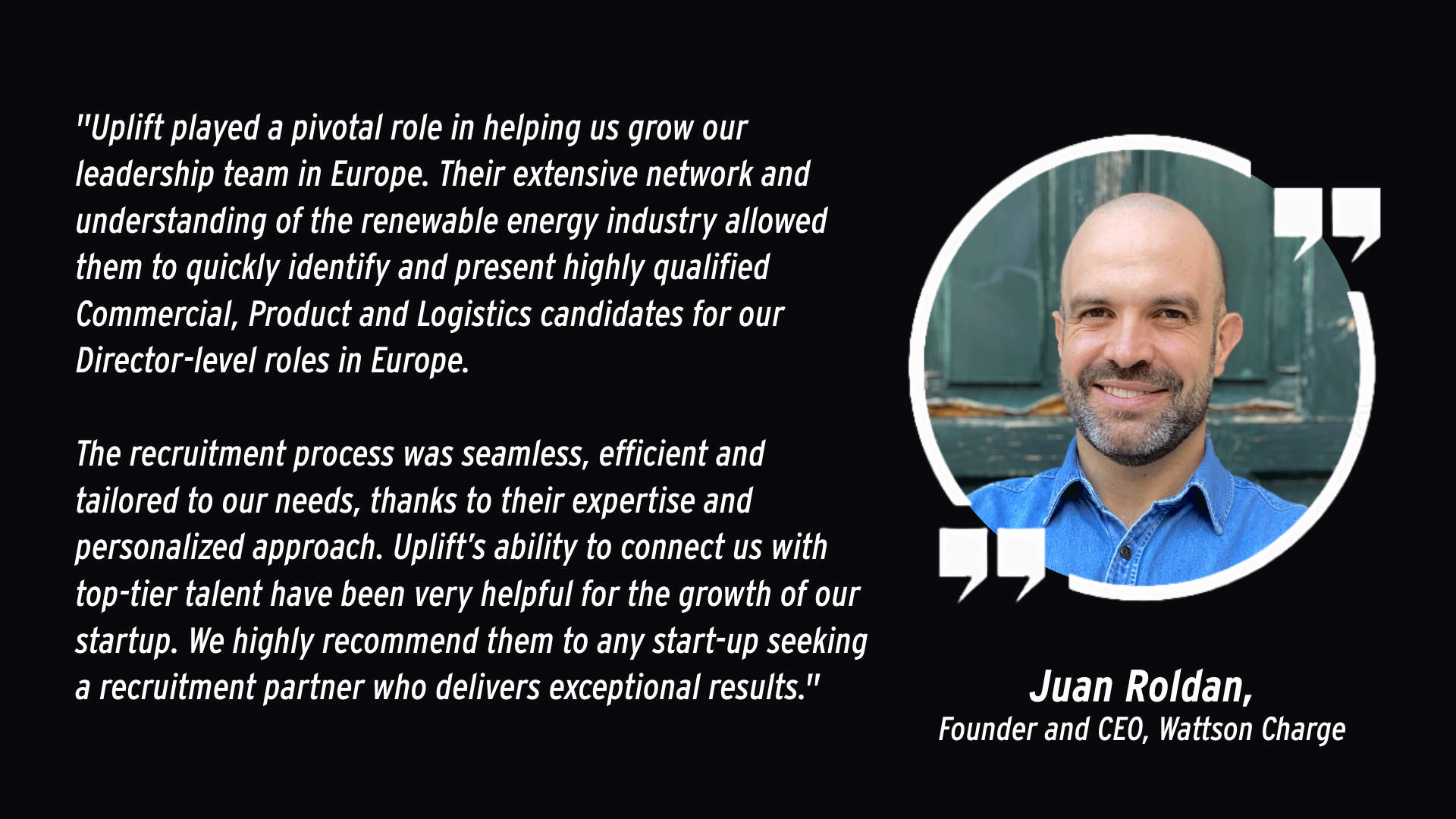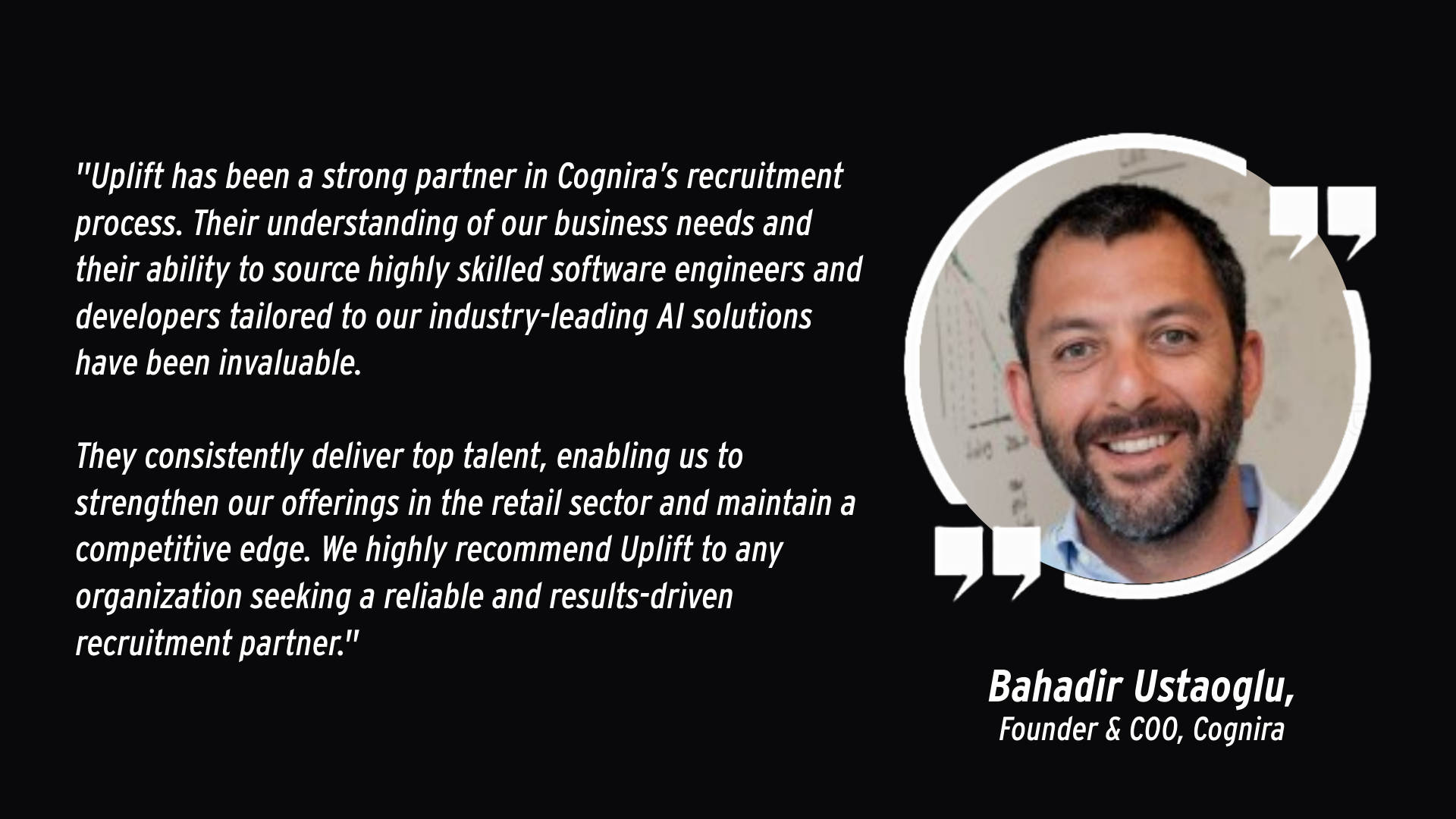Why People Make or Break Startups: Recruitment Advice for Startup Founders
13 February 2025•
Every year, approximately 300 million startups are launched worldwide. Yet, upwards of 90% fail—not just due to funding constraints or market competition, but often because of a people-issue; because startups and companies are, at the core, a high-functioning team of people.
"Startups don't fail because they lack a great idea; they fail because they lack the right team to execute on that idea," says Serap Zel, Founder & CEO of Uplift People Consulting. While funding, product-market fit, and customer acquisition are key priorities, without the right people to drive execution, even the most innovative startups can collapse before reaching their full potential.
Unlike established corporations with strong employer brands and vast resources, startups struggle to compete for top talent. They face challenges such as low brand recognition, constrained hiring budgets, and the constant pressure to scale rapidly. But hiring for a startup isn’t just about filling positions—it’s about finding individuals who can navigate uncertainty, take ownership, and grow alongside the company.
"The way startups approach hiring is very different from traditional corporate recruitment," Zel explains. "They don’t just need employees—they need people who can wear multiple hats, thrive in a fast-changing environment, and take initiative without waiting for formal structures to be in place."
In this article, we sit down with Serap at Uplift Consulting to explore:
✅ Why talent acquisition is a make-or-break factor for startups
✅ The key challenges startups face in hiring top talent
✅ Strategies to build a high-performing, future-proof startup team
The Unique Hiring Challenges Startups Face

Limited Brand Recognition in a Competitive Talent Market
One of the biggest challenges for startups is attracting top-tier talent without the brand credibility of established companies.
“Many of the startups we work with—especially in Saudi Arabia and the UAE—struggle to attract talent simply because candidates are unfamiliar with them,” says Serap. “The first thing any candidate does when approached for a role is check the company’s website, LinkedIn, Glassdoor, and reviews on main social media channels. If that presence isn’t strong, they hesitate.”
📊 Data Insights:
- 75% of job seekers consider an employer’s brand before applying for a job.
- In the MENA region, 60% of professionals prioritize working for companies with a strong reputation and clear mission.
💡 Takeaway: Startups must actively shape their employer brand—not just through job postings but through thought leadership, social media storytelling, and showcasing their mission and culture.
The Speed vs. Quality Tradeoff in Hiring
Startups often rush the hiring process, trying to fill positions as quickly as possible. But a bad hire can set a startup back months—or even years.
“We see many startups making emotional hiring decisions, bringing in friends or ex-colleagues instead of running a structured hiring process,” Serap explains. “It’s understandable—they’re moving fast and need people they trust. But this often leads to misalignment and, ultimately, turnover.”
📊 Data Insights: This speed-quality dilemma is real: According to a study from Glassdoor, 58% of recruiters report losing top candidates to competitors because their hiring process was too slow, while others regret making rushed hires.
💡 Takeaway: A structured hiring process with clear role definitions, competency-based interviews, and AI-assisted talent mapping can help startups move quickly while still ensuring quality hires.
Budget Constraints & the Cost of Hiring Mistakes
Unlike large enterprises, startups often lack the financial resources to compete on salary alone. To attract top talent, they must differentiate themselves through alternative incentives such as equity stakes, clear career growth opportunities, and flexible work arrangements. However, budget constraints remain a significant hurdle, often forcing startups to make rushed or suboptimal hiring decisions. These mistakes can be costly: research shows that a bad hire can cost a business approximately 30% of the employee's first-year earnings. For higher-level positions, this figure can escalate dramatically, potentially jeopardizing the startup’s financial stability and growth trajectory.
"For many startups, hiring a full-time recruiter in-house is an expensive commitment," says Serap. "That’s why we introduced Recruitment Process Outsourcing (RPO)—a flexible model where we embed our experienced recruiter in a startup for a few months to help them scale quickly, at a fraction of the cost of traditional recruitment agencies."
📊 Data Insights:
- The average cost of a bad hire is $17,000 for small businesses. (CareerBuilder, 2021)
- In the MENA region, 40% of startups cite budget constraints as their biggest hiring challenge.(Wamda, 2023)
💡 Takeaway: Outsourced recruitment models, flexible hiring strategies, and alternative compensation structures (e.g., stock options) can help startups attract high-quality talent without overspending.
Case in Point: Success Story
Wattson Charge, a company specializing in mobile charging solutions for electric vehicles (EVs) needed to strengthen its leadership team with experienced professionals who understood the complexities of the EV charging infrastructure. Recognizing the challenge of hiring top-tier leadership talent in a competitive industry, Wattson Charge partnered with Uplift People Consulting to support their recruitment efforts.
Over a period of 2 months, Uplift successfully placed 4 critical hires in key leadership roles, ensuring the company had the right expertise to drive its European expansion. This strategic hiring effort helped accelerate Wattson Charge’s market entry and growth, reinforcing their position in the renewable energy sector.

What Startups Should Focus On in Hiring
Building a Strong Employer Brand Early
"The best candidates don’t just look for a paycheck—they look for a mission they believe in," says Serap. Startups must actively shape their narrative by:
- Optimizing their LinkedIn presence
- Encouraging leadership to share insights on industry trends
- Highlighting their mission, vision, and team culture through social media and company blogs
Using AI & Data-Driven Hiring
AI-driven recruitment tools are reshaping talent acquisition, but human judgment remains crucial.
According to a Korn Ferry report, 67% of survey respondents see increased AI usage as a top talent acquisition trend for 2025. Meanwhile, 40% of talent specialists worry that too much AI in recruitment could make the process impersonal, potentially causing them to miss out on top candidates.
"AI can supercharge hiring by scanning relevant candidate profiles in 30+ talent sources—LinkedIn, GitHub, Meetup, regional job boards—but at the end of the day, human judgment on the final hiring decision is irreplaceable," says Serap.
Case in Point: Success Story
Cognira, an AI-driven retail analytics company, was looking to expand its team with highly skilled software engineers to enhance its AI-powered promotion management solutions. Given the competitive landscape for AI and machine learning talent, finding candidates with the right mix of technical expertise and industry knowledge was a significant challenge.
To address this, Cognira partnered with Uplift People Consulting, leveraging their AI-driven recruitment tools and global talent sourcing expertise. Over a period of 4 months, Uplift identified and placed 6 key hires, ensuring Cognira had access to top-tier engineering talent that aligned with their AI innovation goals. By combining data-driven hiring with expert human evaluation, Uplift was able to streamline Cognira’s recruitment process while maintaining the high-quality standards required for these critical roles.

Actionable Takeaways: How Startups Can Win the Talent War
✅ Prioritize Employer Branding – Build credibility to attract top talent.
✅ Use AI & Data for Smarter Hiring – AI speeds up hiring but should complement human oversight.
✅ Balance Speed & Quality – Structured hiring reduces turnover.
✅ Consider Freelancers & Alternative Hiring Models – Tap into global talent pools through remote work and RPO.
✅ Invest in Leadership First – Great leaders attract and retain high-performing teams.
Final Thoughts: The Future of Startup Hiring
"The future of hiring isn’t just about filling roles—it’s about creating a talent strategy that supports long-term growth," says Serap. "Startups that invest in structured hiring processes, employer branding, and leadership development will outperform those that take a short-term approach"
About Uplift People Consulting
Uplift People Consulting is a global recruitment firm specializing in data-driven talent acquisition and executive search. Founded in 2021 by Serap Zel, Uplift operates with a team of 16 senior recruiters across Europe, the Middle East, and the US, providing expert hiring solutions across commercial, technical, and finance roles. The company has successfully placed mid to senior-level talent in 52 countries in 27 industries, including IT/tech, e-commerce, energy, automotive, logistics, and many more. Uplift is leveraging AI-powered sourcing tools and an extensive global network to identify top candidates.
Uplift offers tailored recruitment solutions for startups, scale-ups, and enterprises, including Recruitment Process Outsourcing (RPO), executive search, and leadership alignment services. With a consultative and technology-driven approach, Uplift helps companies hire smarter, faster, and more effectively, ensuring they build the right teams to drive long-term success.
📍 Learn more at uplift-people.com
